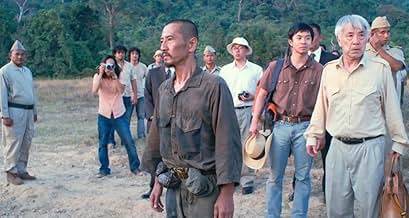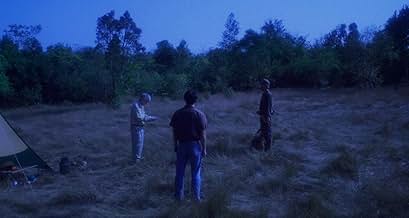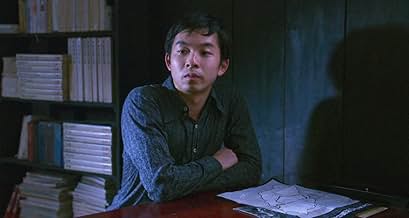PUNTUACIÓN EN IMDb
7,2/10
3,3 mil
TU PUNTUACIÓN
Cuando Japón se rinde al final de la Segunda Guerra Mundial, el soldado Hiroo Onoda se retira a la selva filipina para continuar él mismo la guerra durante otros diez mil días.Cuando Japón se rinde al final de la Segunda Guerra Mundial, el soldado Hiroo Onoda se retira a la selva filipina para continuar él mismo la guerra durante otros diez mil días.Cuando Japón se rinde al final de la Segunda Guerra Mundial, el soldado Hiroo Onoda se retira a la selva filipina para continuar él mismo la guerra durante otros diez mil días.
- Dirección
- Guión
- Reparto principal
- Premios
- 5 premios y 20 nominaciones en total
Yûya Endô
- Hiroo Onoda - Young
- (as Endô Yûya)
Kanji Tsuda
- Hiroo Onoda - Old
- (as Tsuda Kanji)
Yûya Matsuura
- Kinshichi Kozuka - Young
- (as Matsuura Yûya)
Tetsuya Chiba
- Kinshichi Kozuka - Old
- (as Chiba Tetsuya)
Shinsuke Kato
- Shôichi Shimada
- (as Katô Shinsuke)
Kai Inowaki
- Yûichi Akatsu
- (as Inowaki Kai)
Issei Ogata
- Major Yoshimi Taniguchi
- (as Issey Ogata)
Taiga Nakano
- Norio Suzuki - The Tourist
- (as Nakano Taïga)
Nobuhiro Suwa
- Tanejirô Onoda - Onoda's Father
- (as Suwa Nobuhiro)
Mutsuo Yoshioka
- Captain Hayakawa
- (as Yoshioka Mutsuo)
Tomomitsu Adachi
- Governor-General Shigenori Kuroda
- (as Adachi Tomomitsu)
Kyûsaku Shimada
- Lieutenant Suehiro
- (as Shimada Kyûsaku)
Jemuel Satumba
- Filipino Prisoner
- (as Jemuel Cedrick Satumba)
Ryû Morioka
- Student
- (as Ryu Morioka)
Akira Morita
- Extra
- (as Morita Akira)
Reseñas destacadas
The case of Onoda, a WW2 Japanese soldier who carried on fighting for thirty years on the Philippine island of Lubang before being persuaded to give up, was a celebrated case in the mid 1970s, and I was really impressed by this dramatic reconstruction of his life. It's a high quality movie, beautifully filmed, thoughtful, and well played all round, though I also thought it a bit too long at more than 2.5 hours. There are great performances all round and solid direction which almost has a David Lean approach at times (no bad thing), so it's a 'small scale epic' with a heart, and well worth a view. There are some supremely effective moments, and the film deserves a wider audience, though you do have spare quite a bit of time.
Felt it is a bit too long in several scenes particularly early on, but watched it very smoothly due to the great story line.
Actors are all very impressive. Performance by Taiga Nakano was a relief in otherwise very serious picture.
Director Arthur Harari should deserve an admiration creating all Japanese language picture despite limited business prospect.
Ken Kai.
Actors are all very impressive. Performance by Taiga Nakano was a relief in otherwise very serious picture.
Director Arthur Harari should deserve an admiration creating all Japanese language picture despite limited business prospect.
Ken Kai.
Although a little bit long, this is about offering us to share a rather unique and captivating life experience, that of brainwashed Japanese soldiers who only stopped the war 30 years after the capitulation. I appreciated the warm and moist beauty of the jungle and the tropical forest, the change of scenery provided, the sober image which seems authentic and of the period, the "film" aspect and documentary grain. Documentary also as long as there is no lady state. Innocent people go there. The story that is told to us is quite simply captivating and I would not have believed that this anecdote from History, which could be summed up in a few lines, could fit into such a great film. With hindsight, however, I can understand that it does not please some who would fall into boredom; with this film it's a bit all or nothing, you have to succeed in immersing yourself. It is a French film, and as such it must be emphasized that it is a nugget.
Hiro Onoda is talked of in WW2 history as being the last Japanese soldier to surrender; 29 years after the end of WW2 in 1945 (1946 for total end for Japan) on the Philippine island of Lubang. I often wonder why they chose him as the one who got the most attention, story's and films. This is because he was not the last Japanese soldier of WW2 to surrender.
That particular piece of history belongs to Teruo Nakamura who lived for 30 years in the jungle of Morotai; in the old Dutch East Indies. I found out it was because he was treated disgustingly by the Japanese government of the time in 1974 and, that they did not consider him worthy of Japanese soldier honours. This was because his real name was Attun Palalin and he came from ethnic 'Amis', as a native of Taiwan, which was then called Formosa Island, before World War II became a colony of the Japanese Empire.
They and over a 100 others were found scattered on various islands, still fighting years after the end of the war. The last most recent discovery is of 2 soldiers aged 83 and 86 who were found 60 years after the wars end.
I'm sure that there were probably a good many who were never found and that is a shame the Japanese will have to bear forever. It is good that story's such as this come to light and allow later generations to realize the sheer futility of war. The only negative to this film was it being at least an hour too long (it runs for 2:46 minutes) and, very slow paced and a personal belief that this did not follow his story as written in his daily diary of events.
R. I. P. To all of those brave men, lost souls and survivors and also, to any other nationality soldiers who were left behind and stranded on ex island military bases.
To hell with Russia's Vladimir Putin and his attempt to take back what Russia wrongly stole after WW2. The Ukraine is 'Not Gonna Take It' and a lot of Russian families will once again suffer the wasted loss of loved ones.
That particular piece of history belongs to Teruo Nakamura who lived for 30 years in the jungle of Morotai; in the old Dutch East Indies. I found out it was because he was treated disgustingly by the Japanese government of the time in 1974 and, that they did not consider him worthy of Japanese soldier honours. This was because his real name was Attun Palalin and he came from ethnic 'Amis', as a native of Taiwan, which was then called Formosa Island, before World War II became a colony of the Japanese Empire.
They and over a 100 others were found scattered on various islands, still fighting years after the end of the war. The last most recent discovery is of 2 soldiers aged 83 and 86 who were found 60 years after the wars end.
I'm sure that there were probably a good many who were never found and that is a shame the Japanese will have to bear forever. It is good that story's such as this come to light and allow later generations to realize the sheer futility of war. The only negative to this film was it being at least an hour too long (it runs for 2:46 minutes) and, very slow paced and a personal belief that this did not follow his story as written in his daily diary of events.
R. I. P. To all of those brave men, lost souls and survivors and also, to any other nationality soldiers who were left behind and stranded on ex island military bases.
To hell with Russia's Vladimir Putin and his attempt to take back what Russia wrongly stole after WW2. The Ukraine is 'Not Gonna Take It' and a lot of Russian families will once again suffer the wasted loss of loved ones.
What a good surprise this film directed by a French and speaking of the war in the Pacific from the Japanese point of view. So unexpected and awesome in the same time. I could not believe that this young director is not under the influence of Clint Eastwood's LETTERS FROM IWO JIMA, John Boorman's HELL IN THE PACIFIC or Kon Ichikawa's FIRES IN THE PLAINS. Impossible for me to think that he would have never heard of those three iconic films. Back to this one, I don't know how anyone could say harm about it, except maybe a bit too long; yes, maybe. Plus, it speaks not only of the japanese soldiers, but not the kamikaze or simple fighters, but some kind of secret section of soldiers sent into a Philippines Island. The young director from France is also aware of the Mizoguchi's influence and with the poetic lines of the Japanese spirit. Good film to be watched at any cost. Only for this incredible but so authentic story.
¿Sabías que...?
- CuriosidadesWhilst set on a remote Philippines Island the film was in fact shot on location in the kingdom country of Cambodia.
Selecciones populares
Inicia sesión para calificar y añadir a tu lista para recibir recomendaciones personalizadas
- How long is Onoda: 10,000 Nights in the Jungle?Con tecnología de Alexa
Detalles
- Fecha de lanzamiento
- Países de origen
- Sitios oficiales
- Idiomas
- Títulos en diferentes países
- Onoda, 10.000 nits a la jungla
- Localizaciones del rodaje
- Bokor National Forest, Cambodia(jungle)
- Empresas productoras
- Ver más compañías en los créditos en IMDbPro
Taquilla
- Presupuesto
- 4.530.000 € (estimación)
- Recaudación en todo el mundo
- 262.276 US$
- Duración
- 2h 53min(173 min)
- Color
- Relación de aspecto
- 1.85 : 1
Contribuir a esta página
Sugerir un cambio o añadir el contenido que falta


























